
Home » Education » What is the Difference Between Capstone and Thesis

What is the Difference Between Capstone and Thesis
The main difference between capstone and thesis is that capstone involves using existing knowledge to solve a problem in a particular field of study, whereas thesis is more scholarly in nature and contribute new knowledge to a particular field of study
Both capstone and thesis serve as the final projects of an academic course. They require a long-term commitment as students will have to spend a lot of time on their research. When done successfully, they can serve as the basis of a student’s professional portfolio.
Key Areas Covered
1. What is a Capstone – Definition, Features 2. What is a Thesis – Definition, Features 3. Difference Between Capstone and Thesis – Comparison of Key Differences

What is a Capstone
A capstone is a multilayered project that serves as a culminating academic experience for students, typically at the end of an academic program. Moreover, a capstone project may take many forms. In such projects, students select a topic or social problem that interests them, conduct research on that subject, record the results or findings, create a final product, showcasing their conclusions, as well as their learning acquisition. The final product can take many forms, such as papers, multimedia presentations, and short films. Students may also have to do an oral presentation on the project in front of a panel of teachers and experts who will evaluate the quality of the project.

Capstone projects encourage students to think critically and face challenges. They can also develop skills such as research skills, media literacy, teamwork, planning, goal setting, oral communication, public speaking, and self-sufficiency. These skills will help students in their careers as well as adult life. Furthermore, these projects tend to be interdisciplinary, i.e., students have to use various skills and research issues across many different domains of knowledge.
What is a Thesis
A thesis or dissertation is a long research paper that typically serves as the final project for a university degree. Submitting a thesis is generally required for completing undergraduate honours, masters , and doctoral degrees . The theses are very long and may contain hundreds of pages. They are also scholarly in nature and allows students to contribute valuable research in their field of study.

Moreover, a major part of a thesis work involves research and writing. It generally has advanced research design and analysis. When writing a thesis, the students will have to prove or disapprove a hypothesis , and their conclusions have to be backed by extensive research and an insightful, learned description of how they got to that conclusion. In some degree programs, students also have to perform an oral defence of the thesis paper in front of a panel of experts.
Parts of a Thesis
These are the components you will usually find in a thesis paper.
- Title Page
- Abstract
- Table of Contents
- List of Figures
- List of Tables
- Introduction
- Methods
- Discussion
- Conclusions
- Recommendations
- Acknowledgements
- References
Difference Between Capstone and Thesis
A capstone is a multilayered project that serves as a culminating academic experience for students, typically at the end of an academic program, whereas a thesis is a long research paper that typically serves as the final project for a university degree.
A thesis is more scholarly in nature than a capstone project.
Level of Education
Capstone projects can be done by high school students, college students, etc., whereas theses are required in higher levels of academia, usually in undergraduate honours degrees, masters, or doctorate levels.
Final Product
In a capstone project, the final product can take many forms, for example, paper, multimedia presentation, short film, etc. However, in a thesis, the final product is always a paper.
A capstone is a multilayered project that serves as a culminating academic experience for students, typically at the end of an academic program, whereas a thesis is a long research paper that typically serves as the final project for a university degree. Moreover, a thesis is more scholarly in nature than a capstone project. Therefore, this is is the main difference between capstone and thesis.
1. Stute, Martin. “ How to Write Your Thesis .” How to Write a Thesis. 2. “ Capstone Project Definition .” The Glossary of Education Reform, 23 Mar. 2016.
Image Courtesy:
1. “910524” (CC0) via Pxhere 2. “thesis” By Vectors Point, PK (CC0) via TheNounProject
About the Author: Hasa
Hasanthi is a seasoned content writer and editor with over 8 years of experience. Armed with a BA degree in English and a knack for digital marketing, she explores her passions for literature, history, culture, and food through her engaging and informative writing.
You May Also Like These
Leave a reply cancel reply.
What Is a Capstone Project vs. Thesis

As students near the end of their academic journey, they encounter a crucial project called the capstone – a culmination of all they've learned. But what exactly is a capstone project?
This article aims to demystify capstone projects, explaining what they are, why they matter, and what you can expect when you embark on this final academic endeavor.
Capstone Project Meaning
A capstone project is a comprehensive, culminating academic endeavor undertaken by students typically in their final year of study.
It synthesizes their learning experiences, requiring students to apply the knowledge, skills, and competencies gained throughout their academic journey. A capstone project aims to address a real-world problem or explore a topic of interest in depth.
As interdisciplinary papers, capstone projects encourage critical thinking, problem-solving, and creativity. They allow students to showcase their mastery of their field of study and demonstrate their readiness for future academic or professional pursuits.
Now that we’ve defined what is a capstone project, let’s discuss its importance in the academic landscape. In case you have short-form compositions to handle, simply say, ‘ do my essay for me ,’ and our writers will take care of your workload.
Why Is a Capstone Project Important
A capstone project is crucial because it allows students to combine everything they've learned in school and apply it to real-life situations or big problems.
It's like the ultimate test of what they know and can do. By working on these projects, students get hands-on experience, learn to think critically and figure out how to solve tough problems.
Plus, it's a chance to show off their skills and prove they're ready for whatever comes next, whether that's starting a career or going on to more schooling.
Never Written Capstones Before?
Professional writers across dozens of subjects can help you right now.
What Is the Purpose of a Capstone Project
Here are three key purposes of a capstone project:
%20(1).webp)
Integration of Knowledge and Skills
Capstones often require students to draw upon the knowledge and skills they have acquired throughout their academic program. The importance of capstone project lies in helping students synthesize what they have learned and apply it to a real-world problem or project.
This integration helps students demonstrate their proficiency and readiness for graduation or entry into their chosen profession.
Culmination of Learning
Capstone projects culminate a student's academic journey, allowing them to apply theoretical knowledge to real-world scenarios.
tackling a significant project or problem, students demonstrate their understanding of concepts and their ability to translate them into practical solutions, reinforcing their learning journey.
Professional Development
Capstone projects allow students to develop skills relevant to their future careers. These projects can also be tangible examples of their capabilities to potential employers or graduate programs.
Whether it's conducting research, presenting findings, or collaborating with peers, students gain valuable experience that enhances their professional readiness.
Types of Capstone Projects
Capstones vary widely depending on the academic discipline, institution, and specific program requirements. Here are some common types:
What Is the Difference Between a Thesis and a Capstone Project
Here's a breakdown of the key differences between a thesis and a capstone project:
How to Write a Capstone Project
Let's dive into the specifics with actionable and meaningful steps for writing a capstone project:
1. Select a Pertinent Topic
Identify a topic that aligns with your academic interests, program requirements, and real-world relevance. Consider issues or challenges within your field that merit further exploration or solution.
Conduct thorough research to ensure the topic is both feasible and significant. Here are some brilliant capstone ideas for your inspiration.
2. Define Clear Objectives
Clearly articulate the objectives of your capstone project. What specific outcomes do you aim to achieve?
Whether it's solving a problem, answering a research question, or developing a product, ensure your objectives are specific, measurable, achievable, relevant, and time-bound (SMART).
3. Conduct Comprehensive Research
Dive deep into existing literature, theories, and empirical evidence related to your chosen topic. Identify gaps, controversies, or areas for further investigation.
Synthesize relevant findings and insights to inform the development of your project and provide a solid foundation for your analysis or implementation.
4. Develop a Structured Plan
What is a capstone project in college without a rigid structure? Outline a comprehensive plan for your capstone project, including key milestones, tasks, and deadlines.
Break down the project into manageable phases, such as literature review, data collection, analysis, and presentation. Establish clear criteria for success and regularly monitor progress to stay on track.
5. Implement Methodological Rigor
If your project involves research, ensure methodological rigor by selecting appropriate research methods, tools, and techniques.
Develop a detailed research design or project plan that addresses key methodological considerations, such as sampling, data collection, analysis, and validity. Adhere to ethical guidelines and best practices throughout the research process.
6. Analyze and Interpret Findings
Analyze your data or findings using appropriate analytical techniques and tools. Interpret the results in relation to your research questions or objectives, highlighting key patterns, trends, or insights.
Critically evaluate the significance and implications of your findings within the broader context of your field or industry.
7. Communicate Effectively
Present your capstone project clearly, concisely, and compellingly. Whether it's a written report, presentation, or multimedia deliverable, tailor your communication style to your target audience. Clearly articulate your research questions, methodology, findings, and conclusions.
Use visuals, examples, and real-world applications to enhance understanding and engagement. Be prepared to defend your project and answer questions from peers, faculty, or stakeholders.
In wrapping up, what is a capstone project? It’s like the grand finale of your academic journey, where all the knowledge and skills you've acquired come together in one big project.
It's not just about passing a test or getting a grade – it's about proving you've got what it takes to make a real difference in the world. So, if you ever need capstone project help , our writers will gladly lend you a hand in no time.
Due Date Is Just Around the Corner?
Streamline the writing progress with our expert service!
What Is a Capstone Project in College?
How to do a capstone project, how long does a capstone project take to complete.

Annie Lambert
specializes in creating authoritative content on marketing, business, and finance, with a versatile ability to handle any essay type and dissertations. With a Master’s degree in Business Administration and a passion for social issues, her writing not only educates but also inspires action. On EssayPro blog, Annie delivers detailed guides and thought-provoking discussions on pressing economic and social topics. When not writing, she’s a guest speaker at various business seminars.

is an expert in nursing and healthcare, with a strong background in history, law, and literature. Holding advanced degrees in nursing and public health, his analytical approach and comprehensive knowledge help students navigate complex topics. On EssayPro blog, Adam provides insightful articles on everything from historical analysis to the intricacies of healthcare policies. In his downtime, he enjoys historical documentaries and volunteering at local clinics.
- T. (2023, June 16). What Is a Capstone Project? National University. https://www.nu.edu/blog/what-is-a-capstone-project/
- Lukins, S. (2024, May 12). What is a capstone project? And why is it important? Top Universities. https://www.topuniversities.com/student-info/careers-advice-articles/what-capstone-project-why-it-important
- Capstone Project vs. Thesis: What’s the Difference? (2021, December 9). UAGC. https://www.uagc.edu/blog/capstone-project-vs-thesis-whats-difference
Related Articles

Dissertation vs Thesis vs Capstone Project What’s the difference?
By: Derek Jansen (MBA) | Expert Reviewed By: Dr. Eunice Rautenbach | October 2020
At Grad Coach, we receive questions about dissertation and thesis writing on a daily basis – everything from how to find a good research topic to which research methods to use and how to analyse the data.
One of the most common questions we receive is “what’s the difference between a dissertation and thesis?” . If you look around online, you’ll find a lot of confusing and often contrasting answers. In this post we’ll clear it up, once and for all…
Need a helping hand?
Dissertation vs Thesis: Showdown Time
Before comparing dissertations to theses, it’s useful to first understand what both of these are and what they have in common .
Dissertations and theses are both formal academic research projects . In other words, they’re academic projects that involve you undertaking research in a structured, systematic way. The research process typically involves the following steps :
- Asking a well-articulated and meaningful research question (or questions).
- Assessing what other researchers have said in relation to that question (this is usually called a literature review – you can learn more about that up here).
- Undertaking your own research using a clearly justified methodology – this often involves some sort of fieldwork such as interviews or surveys – and lastly,
- Deriving an answer to your research question based on your analysis.
In other words, theses and dissertations are both formal, structured research projects that involve using a clearly articulated methodology to draw out insights and answers to your research questions . So, in this respect, they are, for the most part, the same thing.
But, how are they different then?
Well, the key difference between a dissertation and a thesis is, for the most part, the level of study – in other words, undergrad, master or PhD. By extension, this also means that the complexity and rigorousness of the research differs between dissertations and theses.

So, which is which?
This is where it gets a bit confusing. The meaning of dissertation or thesis varies depending on the country or region of study. For example, in the UK, a dissertation is generally a research project that’s completed at the end of a Masters-level degree, whereas a thesis is completed for a Doctoral-level degree.
Conversely, the terminology is flipped around in the US (and some other countries). In other words, a thesis is completed for a Masters-level degree, while a dissertation is completed for PhD (or any other doctoral-level degree).
Simply put, a dissertation and a thesis are essentially the same thing, but at different levels of study . The exact terminology varies from country to country, and sometimes it even varies between universities in the same country. Some universities will also refer to this type of project as a capstone project . In addition, some universities will also require an oral exam or viva voce , especially for doctoral-level projects.
Given that there are more than 25,000 universities scattered across the globe, all of this terminological complexity can cause some confusion. To be safe, make sure that you thoroughly read the brief provided by your university for your dissertation or thesis, and if possible, visit the university library to have a look at past students’ projects . This will help you get a feel for your institution’s norms and spot any nuances in terms of their specific requirements so that you can give them exactly what they want.

Let’s recap
Dissertations and theses are both formal academic research projects . The main difference is the level of study – undergrad, Masters or PhD. Terminology tends to vary from country to country, and even within countries.
Need help with your research project?
Get in touch with a friendly Grad Coach to discuss how we can help you fast-track your dissertation or thesis today. Book a free, no-obligation consultation here.

Psst... there’s more!
This post was based on one of our popular Research Bootcamps . If you're working on a research project, you'll definitely want to check this out ...
You Might Also Like:

GRADCOACH youtube and materials are awesome for new researchers. Keep posting such materials so that many new researchers can benefit form them.
Am happy to be part of the family hope you will help me with more information through my email
Trackbacks/Pingbacks
- What Is Research Methodology? Simple Definition (With Examples) - Grad Coach - […] you’ve started working on your first piece of formal research – be it a dissertation, thesis or research project…
Submit a Comment Cancel reply
Your email address will not be published. Required fields are marked *
Save my name, email, and website in this browser for the next time I comment.
- Print Friendly

Online Students
For All Online Programs
International Students
On Campus, need or have Visa
Campus Students
For All Campus Programs
What is a Capstone Project in College?

The capstone project in college is the apogee, or completion marker, of a student's coursework leading to the culmination of their program with a degree in their chosen field of study. The original definition of a capstone focuses on the actual stone placed at the top of a wall or building, marking the successful completion of the structure. It's a significant and celebrated piece of architecture, considered to be the most important of an entire construction project.
"(Capstone projects are) the apex of all a student's work done throughout their college career," said Dr. Jeff Czarnec , a social sciences adjunct online and on-campus at Southern New Hampshire University (SNHU). Retired after 23 years in law enforcement, Czarnec served as an associate dean of criminal justice and social sciences at SNHU for nearly a decade. He now leverages his extensive background to teach social sciences, enriching the academic experience with his practical insights.
When entering a capstone course, there's an expectation that you have all the necessary skills and knowledge to be successful.

You have the opportunity to pick a research topic that is of interest to you and run with it. "After having to write research papers in all of their courses prior to (the capstone), the task is not one to dread, but to enjoy. It is their time to shine as students and to enjoy the journey," MacCarty said.
A capstone course is more than a potential degree requirement. It can serve as an opportunity to demonstrate knowledge mastery and creative thinking, which may help you stand out to potential employers.
What is Involved in a Capstone Project?

Each university, program and instructor may have different requirements — or models — for a capstone project. According to Czarnec, a general design might first include selecting a topic of interest that the instructor will approve.
Czarnec said that, depending on the program, a capstone may include anything from a video presentation or an architectural model to an art exhibit or short film; however, it almost always includes a paper demonstrating an introduction, theory, evaluation, research and individual issues relevant to the proposal.
"Students are expected to be ready to enter the world as professionals in their field upon completion of the capstone course," said MacCarty.
The time it takes to complete a capstone project usually depends on the course's length. If you're in an undergraduate online program at SNHU, for instance, your capstone course would take eight weeks to complete, Czarnec said.
Capstone courses are research-based, and you can choose your topic early on, allowing you more freedom to conduct research independently. Capstone topics usually align with a program's specific disciplines, too.
For example, in the social sciences realm, "our focus is on human behavior and cognition, which may be different from a capstone course in business or STEM," MacCarty said.
Find Your Program
Types of capstones.
There are many types of capstone projects that you could consider, and they vary from learner to learner, Czarnec said. "Some will investigate issues or phenomenon that they are familiar with either professionally, personally or courtesy of a discipline-related source, such (as) a police or human services agency," he said.
In a nutshell, a rough outline of a capstone, according to Czarnec, may look something like this:
- Select a topic and have it approved by the instructor
- Evaluate relevance to the proposal
- Perform necessary research
- Present results in the agreed-upon fashion
Czarnec said that if you're looking for a capstone topic, you may consider focusing on an area you're passionate about or you could also try to ask you instructor for some assistance. For example, Czarnec said that he can act as a guide, mentor, editor and research resource for his students to help them focus and narrow their search for a capstone topic.
Are Capstone Projects Difficult?
"Not necessarily," said Czarnec. "It does force you to be efficient and very specific to topic. No fluff. Straight forward. Razor sharp."
The capstone is more of an opportunity to catch your breath, he said, and to retrace and pull up what you have learned in a more stress-free environment .
"It helps validate students as learners," Czarnec said.
Depending on the major and course requirements, there may be opportunities to connect with outside contacts, not only to assist with the capstone project research and problem statement but also to provide a networking community .
"Not every research project is, nor should they be, the same," Czarnec said. "Everyone has a different approach."
What is the Difference Between a Thesis and a Capstone Project?
A capstone is similar to a thesis in that the starting point involves the strengths needed for a thesis or dissertation work. For example, you may need to consider the skeletal structure of research and form your theory, hypothesis and problem statement.
"While a capstone is certainly a scholarly piece of work and does share some aspects of a thesis, the time and detail that is required of a master's thesis is greater," MacCarty said.
A capstone paper may be 25 pages, whereas a thesis could be 100 or more. If you choose to further your education beyond a bachelor's degree, the capstone project could be an invaluable tool in preparing for a graduate thesis.
Capstone Projects are About Your Success
Capstones of all programs are leading you to the end game, Czarnec said. The goal is to develop you into a well-rounded thinker who can pull their work together in a coherent, articulate, well-organized fashion while considering the demands of the profession or vocation you're interested in.
The focus and intent of a capstone should be to create an effective device to assess and measure all that you've learned throughout your program in an aggregate fashion so you can demonstrate your life-long vocational skills in a nice, neat package.
"My goal is for students to leave the program confident about their skills and abilities," said Czarnec.
MacCarty said that capstone courses should be structured to support your success in fulfilling program requirements and allow you the opportunity to showcase your academic abilities and skills gained throughout your degree program.
A degree can change your life. Choose your program from 200+ SNHU degrees that can take you where you want to go.
Laurie Smith '14 is a writer, editor and communications specialist. Connect with her on LinkedIn .

Explore more content like this article

What is an Associate of Science Good For?

Time Management Strategies: 8 Tips for Balancing College and Life

What is a Terminal Degree?
About southern new hampshire university.

SNHU is a nonprofit, accredited university with a mission to make high-quality education more accessible and affordable for everyone.
Founded in 1932, and online since 1995, we’ve helped countless students reach their goals with flexible, career-focused programs . Our 300-acre campus in Manchester, NH is home to over 3,000 students, and we serve over 135,000 students online. Visit our about SNHU page to learn more about our mission, accreditations, leadership team, national recognitions and awards.
Understanding the Differences Between Dissertation, Thesis, and Capstone Projects
This article explains the key differences between dissertation, thesis, and capstone projects, and offers insights into how to approach each project to ensure academic success.
If you're pursuing an advanced degree, you may be required to complete a dissertation, thesis, or capstone project as part of your program. While these projects share some similarities, there are also important differences to understand.
A dissertation is typically required for a doctoral degree, while a thesis is required for a master's degree. Both involve extensive research, data collection and analysis, and a written report that contributes to the body of knowledge in the field of study. A capstone project, on the other hand, is typically a culminating project required for a variety of undergraduate and graduate degree programs. It may involve original research, but can also take the form of a creative project or a community service project.
Dissertation: A dissertation is a research project required to complete a doctoral degree program. It is a comprehensive study that contributes to the existing body of knowledge in the field of study. A dissertation typically involves original research, data collection and analysis, and a written report that is expected to make a significant contribution to the field of study.
Thesis: A thesis is a research project required to complete a master's degree program. It is usually a shorter and less complex study compared to a dissertation. A thesis may involve original research, but it can also be a literature review, a case study, or a critical analysis of existing research in the field of study.
Capstone: A capstone is a culminating project required to complete a degree program. It is typically undertaken in the final year of study and integrates the knowledge and skills gained throughout the program. A capstone can take various forms, such as a research project, a creative work, or a community service project. It is designed to demonstrate the student's ability to apply what they have learned to real-world problems.
To successfully complete a dissertation, thesis, or capstone project, it's important to have a clear understanding of the project's purpose and requirements. For example, a dissertation will require a more extensive literature review, data collection, and data analysis than a thesis or capstone project. A thesis may require more original research than a capstone project, but less than a dissertation.
In addition, it's important to work closely with your advisor or instructor throughout the project to ensure that you are meeting the requirements and expectations. You may also want to consider seeking out additional resources, such as writing support or statistical analysis services, to help you complete the project successfully.
By understanding the differences between dissertation, thesis, and capstone projects, and approaching each project with a clear plan and support, you can successfully complete your degree program and contribute to the body of knowledge in your field. In summary, a dissertation is a research project required to complete a doctoral degree program, a thesis is a research project required to complete a master's degree program, and a capstone is a culminating project required to complete a degree program.
Search this site
Division of graduate studies menu, division of graduate studies, thesis vs. project.

Theses and Capstone Projects: Writing your thesis or capstone project report
When a final project includes a written document of some sort, students are expected to follow the appropriate MSOE style guide. There are separate style guides for undergraduate and graduate work.
The applicable style guide can be found here:
- MSOE Graduate Student Documentation and Style Guide For Technical Documents
- MSOE Undergraduate Documentation and Style Guide
Thesis and Capstone Reports
MSOE librarians work closely with graduate students and their advisers during the thesis and capstone report phase of their education. The following resources, documents and information will help you complete your final project.
Graduate Thesis and Capstone Report Format Checks
In compliance with Graduate Programs Council (GPC) Policy 4.3.009, the library is responsible for verifying that all MSOE Graduate Thesis and Capstone Report documents comply with MSOE’s format requirements.
Graduate Thesis and Capstone Report Completion
- Graduate Thesis and Capstone Document Process This document walks through the process of completing a masters thesis or capstone document, including the library publication approval check and other considerations.
- Graduate Thesis and Capstone Publication Approval Form Complete this form and submit it to the library along with the thesis or capstone project to be reviewed.
- MSOE Electronic Thesis and Capstone Project Report Permission Form Use this Form to grant MSOE permission to electronically publish a graduate degree thesis or a graduate degree capstone project report or other independent graduate degree final report or essay.
- Library “Non-Circulation Status” Request Form Complete this from to request access restrictions for a thesis or capstone report.
Personal Thesis/Capstone Bindery Request
The library offers a bindery service for graduate students interested in having copies of their thesis or capstone report bound in a durable, sturdy, and attractive hardcover binding. Students are charged a fee per volume for the service. To request binding of a thesis or capstone report, please send an email to [email protected] .
Electronic Publications at MSOE
- Electronic Publications at MSOE A selection of theses and final capstone project reports completed by graduate students at MSOE that have been approved for electronic dissemination.
MSOE electronic publication provides the broadest possible method of disseminating your work. With electronic publication, the full text of your electronic thesis, capstone project report, or final independent report or essay is freely accessible world-wide on the Internet. Electronic publication of your document typically results in more recognition of your research work, wider dissemination of scholarly information, and acceleration of research.
The MSOE Library invites MSOE graduate students who have completed an approved master's thesis, capstone project report, or other independent final report or essay to submit their work to the MSOE Institutional Repository. In order to participate, graduate students must complete and submit a Permission Form in order to enable MSOE to electronically publish their work.
- About the Library
- List of all library guides
- Give feedback
- Print, scan, copy
- Troubleshoot digital access
- Book a study room
- Find eBooks
- Find Codes and Standards
- Find Patents
- References, Citations, and Study Guides
- Find a Journal
If you have suggestions for how to make this page better, please contact Elizabeth Jerow, Assistant Library Director ( [email protected] ).
- Last Updated: Feb 9, 2024 8:42 AM
- URL: https://libguides.msoe.edu/theses-capstone-projects

- Richard G. Trefry Library
- Writing & Citing
Q. What is the difference between a capstone thesis, a creative/applied project, a practicum/critical reflection paper, and a portfolio/critical reflection paper?

- Course-Specific
- Textbooks & Course Materials
- Tutoring & Classroom Help
- 1 Artificial Intelligence
- 43 Formatting
- 5 Information Literacy
- 13 Plagiarism
- 23 Thesis/Capstone/Dissertation
Answered By: APUS Librarians Last Updated: Jan 02, 2020 Views: 5499
NOTE: Each program uses specific capstone options. Not all options are available for each program.
The capstone thesis is a study conducted by the student. According to the EOP Manual , it “must have a substantial research component, present an original argument, use proper academic conventions, including carefully documented primary and/or secondary sources, and should be at least fifty pages in length [not including front and back matter].”
The creative/applied project is a unique project created by the student. It can be a “discrete project, paper, exhibit, performance, or other appropriate task reflecting the integration of knowledge acquired in academic and professional activities.” (From the EOP Manual )
The practicum option is a 160 hour, intern-like project which the student completes with an organization under the supervision of a professor who is “responsible for directing the intellectual content and activities of the practicum.” This option includes a critical reflection paper, an “integration paper [that is] is generally between 25 and 30 pages and follows a method similar to David Kolb’s experiential learning style as the basis and method for writing the paper.” (From the EOP Manual )
The portfolio option is unique to each program: “Each program specifies the artifacts that make up the portfolio. Students are expected to retain these artifacts as they progress through their program and may be asked to submit these artifacts into a portfolio portal throughout the program. The portfolio contains a substantive analysis that contextualizes each artifact, articulates how the artifact demonstrates mastery of the learning outcome, and evaluates the student’s intellectual growth through the program.” The portfolio option also requires a critical reflection paper that demonstrates that “the student can apply relevant and recent literature to the artifacts and program objectives.” This paper should contain a bibliography of sources consulted and be roughly 50 pages (not including front and back matter). (From the EOP Manual )
For more detailed information, see the End of Program Assessment Manual for Graduate Studies and consult with your capstone instructor.
- Share on Facebook
Was this helpful? Yes 4 No 4
writing tutor
Related topics.
- Thesis/Capstone/Dissertation
Need personalized help? Librarians are available 365 days/nights per year! See our schedule.

Learn more about how librarians can help you succeed.
Created by the Great Schools Partnership , the GLOSSARY OF EDUCATION REFORM is a comprehensive online resource that describes widely used school-improvement terms, concepts, and strategies for journalists, parents, and community members. | Learn more »

Capstone Project
Also called a capstone experience , culminating project , or senior exhibition , among many other terms, a capstone project is a multifaceted assignment that serves as a culminating academic and intellectual experience for students, typically during their final year of high school or middle school, or at the end of an academic program or learning-pathway experience . While similar in some ways to a college thesis, capstone projects may take a wide variety of forms, but most are long-term investigative projects that culminate in a final product, presentation, or performance. For example, students may be asked to select a topic, profession, or social problem that interests them, conduct research on the subject, maintain a portfolio of findings or results, create a final product demonstrating their learning acquisition or conclusions (a paper, short film, or multimedia presentation, for example), and give an oral presentation on the project to a panel of teachers, experts, and community members who collectively evaluate its quality.
Capstone projects are generally designed to encourage students to think critically, solve challenging problems, and develop skills such as oral communication, public speaking, research skills, media literacy, teamwork, planning, self-sufficiency, or goal setting—i.e., skills that will help prepare them for college, modern careers, and adult life. In most cases, the projects are also interdisciplinary, in the sense that they require students to apply skills or investigate issues across many different subject areas or domains of knowledge. Capstone projects also tend to encourage students to connect their projects to community issues or problems, and to integrate outside-of-school learning experiences, including activities such as interviews, scientific observations, or internships.
While capstone projects can take a wide variety of forms from school to school, a few examples will help to illustrate both the concept and the general educational intentions:
- Writing, directing, and filming a public-service announcement that will be aired on public-access television
- Designing and building a product, computer program, app, or robot to address a specific need, such as assisting the disabled
- Interning at a nonprofit organization or a legislator’s office to learn more about strategies and policies intended to address social problems, such as poverty, hunger, or homelessness
- Conducting a scientific study over several months or a year to determine the ecological or environmental impact of changes to a local habitat
- Researching an industry or market, and creating a viable business plan for a proposed company that is then “pitched” to a panel of local business leaders
For related discussions, see authentic learning , portfolio , relevance , and 21st century skills .
As a school-reform strategy, capstone projects are often an extension of more systemic school-improvement models or certain teaching philosophies or strategies, such as 21st century skills, community-based learning , proficiency-based learning , project-based learning , or student-centered learning , to name just a few.
The following are a few representative educational goals of capstone projects:
- Increasing the academic rigor of the senior year. Historically, high school students have taken a lighter course load or left school early during their twelfth-grade year, which can contribute to learning loss or insufficient preparation for first-year college work. A more academically and intellectually challenging senior year, filled with demanding but stimulating learning experiences such as a capstone project, the reasoning goes, can reduce senior-year learning loss , keep students in school longer (or otherwise engaged in learning), and increase preparation for college and work.
- Increasing student motivation and engagement. The creative nature of capstone projects, which are typically self-selected by students and based on personal interests, can strengthen student motivation to learn, particularly during a time (twelfth grade) when academic motivation and engagement tend to wane.
- Increasing educational and career aspirations. By involving students in long-term projects that intersect with personal interests and professional aspirations, capstone projects can help students with future planning, goal setting, postsecondary decisions, and career exploration—particularly for those students who may be unfocused, uncertain, or indecisive about their post-graduation plans and aspirations.
- Improving student confidence and self-perceptions. Capstone projects typically require students to take on new responsibilities, be more self-directed, set goals, and follow through on commitments. Completing such projects can boost self-esteem, build confidence, and teach students about the value of accomplishment. Students may also become role models for younger students, which can cultivate leadership abilities and have positive cultural effects within a school.
- Demonstrating learning and proficiency. As one of many educational strategies broadly known as demonstrations of learning , capstone projects can be used to determine student proficiency (in the acquisition of knowledge and skills) or readiness (for college and work) by requiring them to demonstrate what they have learned over the course of their project
In recent years, the capstone-project concept has also entered the domain of state policy. In Rhode Island, for example, the state’s high school graduation requirements stipulate that seniors must complete two out of three assessment options, one of which can be a capstone project. Several other states require students to complete some form of senior project, while in other states such projects may be optional, and students who complete a capstone project may receive special honors or diploma recognition.
Most criticism of or debate about capstone projects is not focused on the strategy itself, or its intrinsic or potential educational value, but rather on the quality of its execution—i.e., capstone projects tend to be criticized when they are poorly designed or reflect low academic standards, or when students are allowed to complete relatively superficial projects of low educational value. In addition, if teachers and students consider capstone projects to be a formality, lower-quality products typically result. And if the projects reflect consistently low standards, quality, and educational value year after year, educators, students, parents, and community members may come to view capstone projects as a waste of time or resources.

Alphabetical Search

Capstone & Thesis Research
Before you begin your research project, steps in doing a capstone paper or project, graduate thesis and dissertation general guidelines, find theses and dissertations, academic writing and research video, watch and learn with webster u. library online presentations, the research cycle.
- Thinking about your Project
- Selecting and Focusing Your Research Topic
- Start Searching
- Literature Review This link opens in a new window
- Doing Primary Research
- Presentation Skills This link opens in a new window
- Specific Graduate Programs
- Writing and Citing
- Mendeley Citation Manager This link opens in a new window
Need help? Ask a librarian or chat
Ask A Librarian for help finding sources, narrowing or expanding your topic, and more!
- Research Desk: 314-246-6950
- Toll-free: 800-985-4279
- Visit us: Library hours
- Search our FAQs or email us
Make sure you understand what is required. Read your assignment carefully and talk with your instructor if you need clarification. Think about how much time and other resources you have and need to complete all parts of the research assignment within the course timetable.
Select a topic area. See the "Selecting and focusing your research topic" tab at left for suggestions on choosing a topic, narrowing your focus, and developing a thesis statement or research question.
Do a literature review. The " Literature Review " tab will link you to helpful resources for planning a search and organizing your results. " Start Searching " will bring you to some examples for using article databases effectively.
Doing primary research (for those students required to do so). Check the "Doing primary research" tab for resources on creating surveys, finding tests, designing studies, etc.
Present your results. " Writing & Citing " will bring you to resources for writing the paper, citing your sources, and avoiding plagiarism. " Presentation skills " will help you create effective visual aids and deliver a professional presentation.
Here you will find everything you need to know about the purpose of a dissertation or thesis and the steps to complete and submit your work.
The Guidelines were created by the Webster University Office of Academic Affairs and approved by Webster University Graduate Council. The most recent version of the Guidelines is the 2023 revision.
- Theses and Dissertation Guidelines
- Does the library have theses in the collection?
- Does the library keep graduate capstone (a.k.a. 6000) papers?
- How do I find a thesis or dissertation?
Academic writing and research: Top tips to transform your paper
- Academic Writing & Research: Top Tips to Transform Your Paper (Recorded on Apr. 3, 2019; 37 minutes) New to writing and research or just want to up your game? Join us! Learn simple and effective tips from Writing Center and Library staff to make your writing more polished and to find and integrate others’ ideas and research to strengthen your thesis and argument. Click here to watch specific parts of this video.
Watch specific topics in this video
Visit our Library Training, Tutorials & Webinars page to see tutorials that will sharpen your research skills and offer helpful guidance in doing a capstone, thesis or advanced research project. Recorded webinars may be watched at your convenience. Live webinars offer an interactive experience with Webster U. librarians present to answer your questions.
The Research Cycle is a circular process with the goal of identifying relevant and useful results. The pieces of the process are:
- Define task: What is your assignment, problem or question?
- Identify options: What kinds of information do you need and where do you look?
- Select your sources: How do you search for them and which do you choose?
- Analyze content: What di you discover and what does it mean?
- Present findings: How do you organize and communicate what you have learned?
When you complete these steps you will need to evaluate your results. Depending on your assignment you may need to refine or change your question and begin the process again.

CMST 101: Introduction to Communications, Marian Lyles: Intro to Research. Seattle Central College Library. Seattle Central College. 10 Feb. 2016. Web. 16 Jun 2016.
- Next: Thinking about your Project >>
- Last Updated: May 31, 2024 8:11 AM
- URL: https://library.webster.edu/capstone

Graduate Student Resource Guide
- Library Resources
- Academic Resources
- Student Resources
- Technical Resources
- Research & Scholarship
- Specialized Services
Introduction
Submitting your thesis/dissertation for publication, need help frustrated do you have writer's block, guidelines and forms, resources to help you with your thesis, dissertation or capstone project.
- Surviving & Thriving in Graduate School
All graduate programs at Lewis University are required to include a culminating capstone experience in the curriculum. The most appropriate capstone experience for each program is determined by the faculty of that program. Doctoral capstone experiences generally include a dissertation requirement or a scholarly integrative project. A Master’s Program Capstone is defined by the University as:
A capstone is a culminating experience of rigorous academic achievement: (a) integrating knowledge from one’s discipline(s); (b) applying specific knowledge; (c) demonstrating knowledge and expertise to the appropriate disciplinary community; and (d) illustrating readiness for transition into more advanced professional or academic pursuits. Capstones consist of program directed experiences, which may include a comprehensive examination, group or individual project, thesis, research/scholarly paper, internship/practicum, or other appropriate culminating academic experiences representative of one’s discipline(s).
This page provides the graduate student with important institutional information to prepare for successful completion of a graduate capstone project, a thesis, or a dissertation, as required by the program. The Doctoral Dissertation Guidelines and the Master’s Thesis Guidelines provide essential information in understanding the prerequisites and minimum standards required by Lewis University.
The Graduate P rogram Director and the student’s advisor are the best source of information relevant to individual program requirements for successfully completing a culminating capstone experience within that program.
Additionally, please check out the other sections on this page for assistance on writing, publishing and seeking copyright protection for your work.

Publishing Your Thes is
The student is not required to publish his/her thesis; however, the student is highly encouraged to submit article(s) from their thesis for publication in a professional journal of the discipline. If the student wishes to publish the thesis as an entity, the thesis must be reviewed and approved for style and formatting by the Office of Graduate Studies.
Publishing Your Dissertation
Why Should You Use ProQuest?
Graduate students all over the world submit dissertations and theses to ProQuest and access the world’s trusted repository for graduate research ProQuest Dissertations & Theses Global. In addition, researchers can cross-search this content with curated collections of scholarly journals, ebooks, news content, reports, working papers and more — across disciplines. ProQuest delivers resources that support academic and professional success.
At any point you have questions or need any help with your research, please feel free to contact us and we will be glad to assist you. please check out our resources on-line (workshops, writing assistance, study room, etc.) or schedule an appointment with a librarian..
- Lewis University Writing Center
- LARC Lab
- Master Thesis Guidelines
- Doctoral Dissertation Guidelines
Thesis Forms
- Master Thesis Committee Approval Form - FORM A
- Master Thesis Proposal Defense Approval - FORM B
- Master Thesis Approval Form - FORM C
Dissertation Forms
- Doctoral Dissertation Committee Approval Form - FORM A
- Doctoral Dissertation Proposal Defense Approval Form - FORM B
- Doctoral Defense Public Announcement Form - FORM C
- Doctoral Dissertation Approval Form - FORM D
- Commencement Ceremony Petition (Dissertation) - FORM E
- Copyright and Intellectual Property Guidelines
- MSIS Capstone Gallery
External Web Resources
- Purdue Online Writing Lab
Recommended Books
- << Previous: Specialized Services
- Next: Surviving & Thriving in Graduate School >>
- Last Updated: Jan 16, 2024 12:58 PM
- URL: https://lewisu.libguides.com/GradStudies

- Customer Reviews
- Extended Essays
- IB Internal Assessment
- Theory of Knowledge
- Literature Review
- Dissertations
- Essay Writing
- Research Writing
- Assignment Help
- Capstone Projects
- College Application
- Online Class
Capstone Project: Definition, Types, Structure, and Examples
by Antony W
January 2, 2024
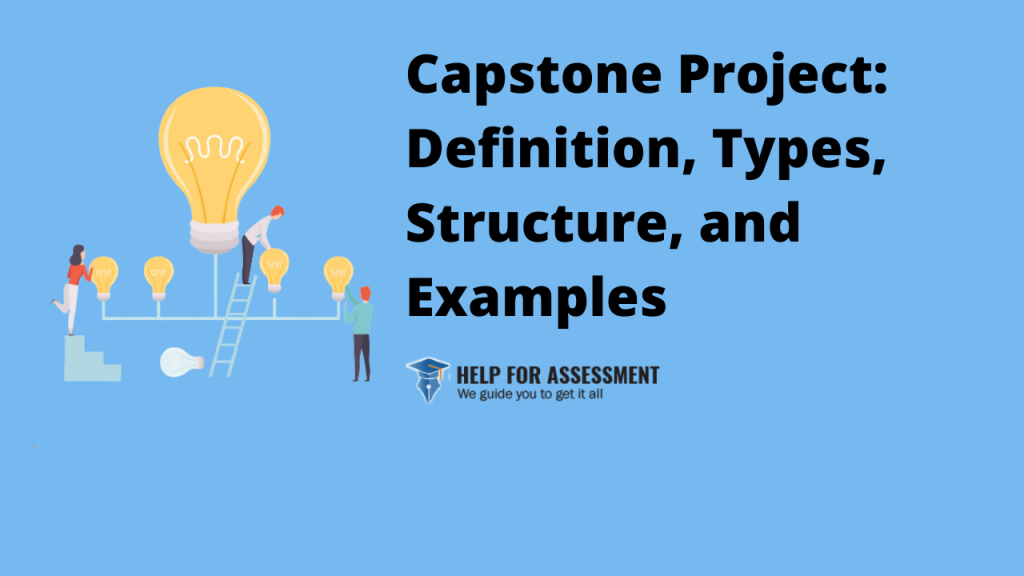
If you're reading this, chances are that you're in your final year of school and the words "capstone project" have come up somewhere in your first or second semester.
You're probably looking for a quick score on the topic - what it's about, a project template, or even a sample. If so, you're in the right place.
Before we get into it, you' need to know that you're in the hands of consummate capstone project experts.
Help for Assessment is composed of scholars at all levels of academic achievement including Masters and Ph.D., all inspired and motivated to help students like you achieve their academic goals. The expertise and experience we have spans years. Even better, this combined academic expertise is placed at your disposal. If your capstone research project is already giving you goosebumps, we will do it for you from scratch including the project proposal, research, write up, and final review before submission.
Remember, you can trust Help for Assessment to complete your capstone project successfully and earn you top grades. All you have to do is order the service here on our service page.
In the meantime, let us explore the definition of the capstone project, types of projects for students, and a sample capstone project.
What Is a Capstone Project?
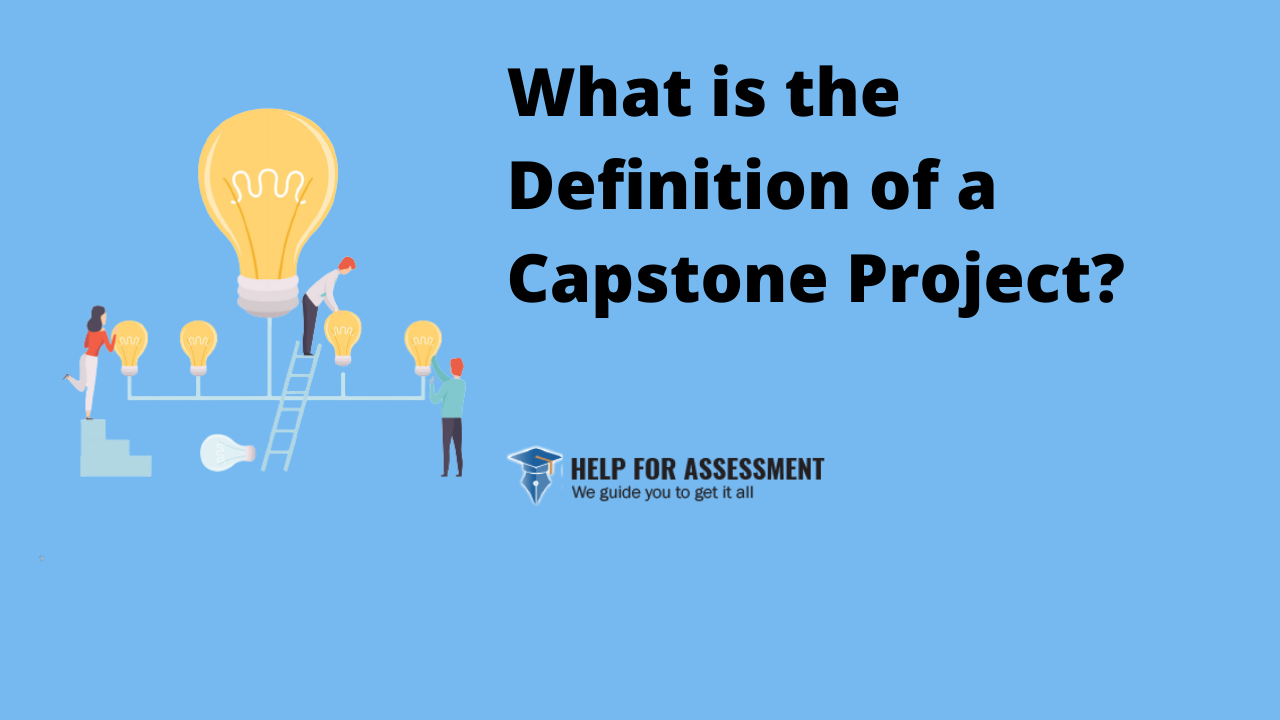
A capstone project in college is a final independent project undertaken in a program of study designed to assess the skills, knowledge, and expertise acquired by the student.
As the name suggests, it is the capstone or crowning achievement of academic life and the last class taken before graduation. It gives you the final credits required to pass the course, which is why every student must take the project.
Since it is designed to assess knowledge and skills gained in a particular discipline, capstone projects vary from school to school and discipline to discipline.
Such a project might involve something as simple as research on a topic, an evaluation of a new technique or method, development of a health program, research into a historical figure or event, or even composing a skit or theatre presentation.
No matter what kind of project you choose to undertake, the result is the same. You get to showcase your understanding of the coursework material learned and display your readiness to enter the professional world to start your career. It is a rewarding experience if done right, but can mess up your final year and possibly your graduation if you manage to mess it up.
Do you know that a successful capstone project also helps to land you lucrative jobs? That’s right, capstone projects are one of the ways potential employers find out just how learned, resourceful, and talented you are. Think of it as a kind of thesis.
Capstone projects are also called culminating projects, experience, senior exhibition, or other similar names. The project is usually self-directed, and most students find it a challenge to even come up with the right capstone project topic.
Capstone Project Vs. Thesis
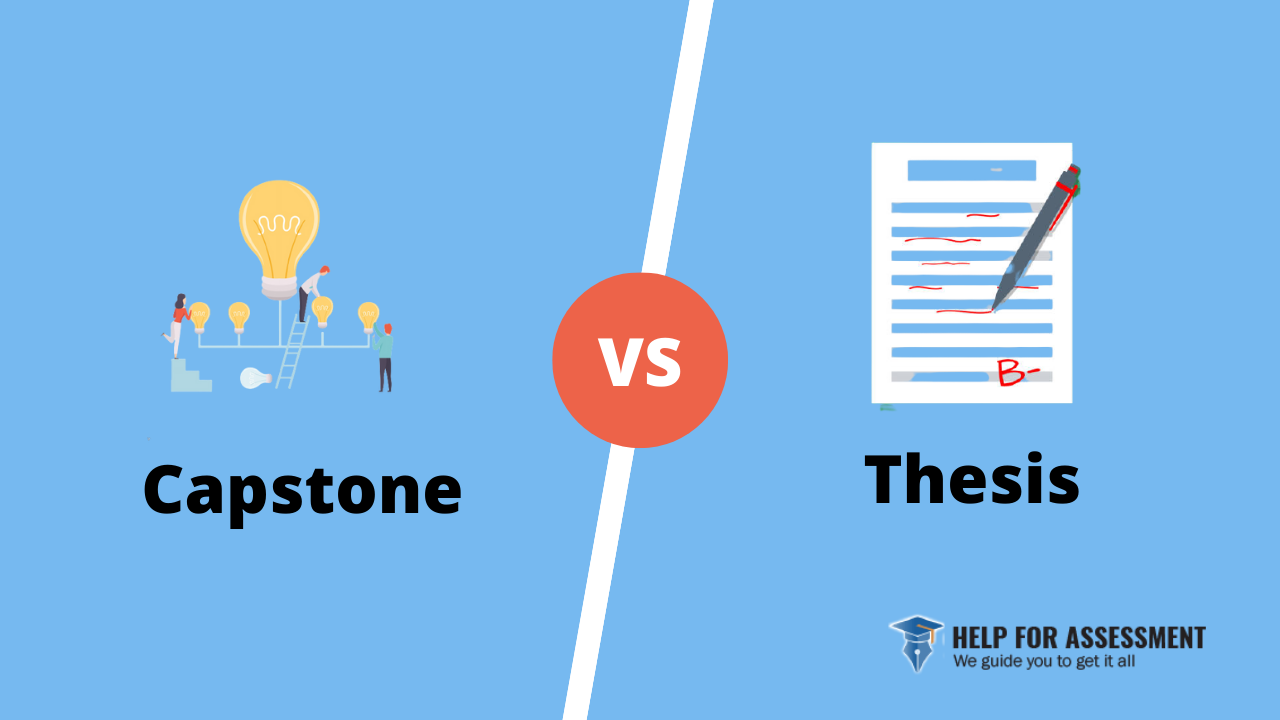
A capstone project and a thesis are both very similar in that they represent a final effort from the student just before graduation.
They are done in partial fulfillment of the requirements of the course being undertaken. The comprehensive approach and assessment involved are very similar, and sometimes the structure and methodology might overlap.
Both also have to be reviewed and approved by the institution and will remain in the public domain after publishing.
However, there are some important differences.
- A thesis is purely academic while a capstone project focuses more on the practical preparation of the student for the real world/job market.
- A thesis is guided by a research question resulting in the addition of new knowledge to the field, while a capstone project is guided by the practical importance of the project to the field.
- A thesis involves academic research and analysis, while a capstone project can be anything including a dance or film.
- A thesis is expected to be original and authentic, while a capstone project will have more loose requirements. You can borrow another person’s capstone project ideas , so long as you demonstrate your own advancement in the field.
- A capstone project will usually only have a brief write-up or report, while a thesis generates a detailed, extensive writeup.
- The final presentation of a thesis, called a defense, is meant to prove and show that you have mastered the subject. You are supposed to be a mini-expert in the field. A capstone project presentation comes off as a kind of exhibition where you showcase your project without having to defend it.
Types of Capstone Projects
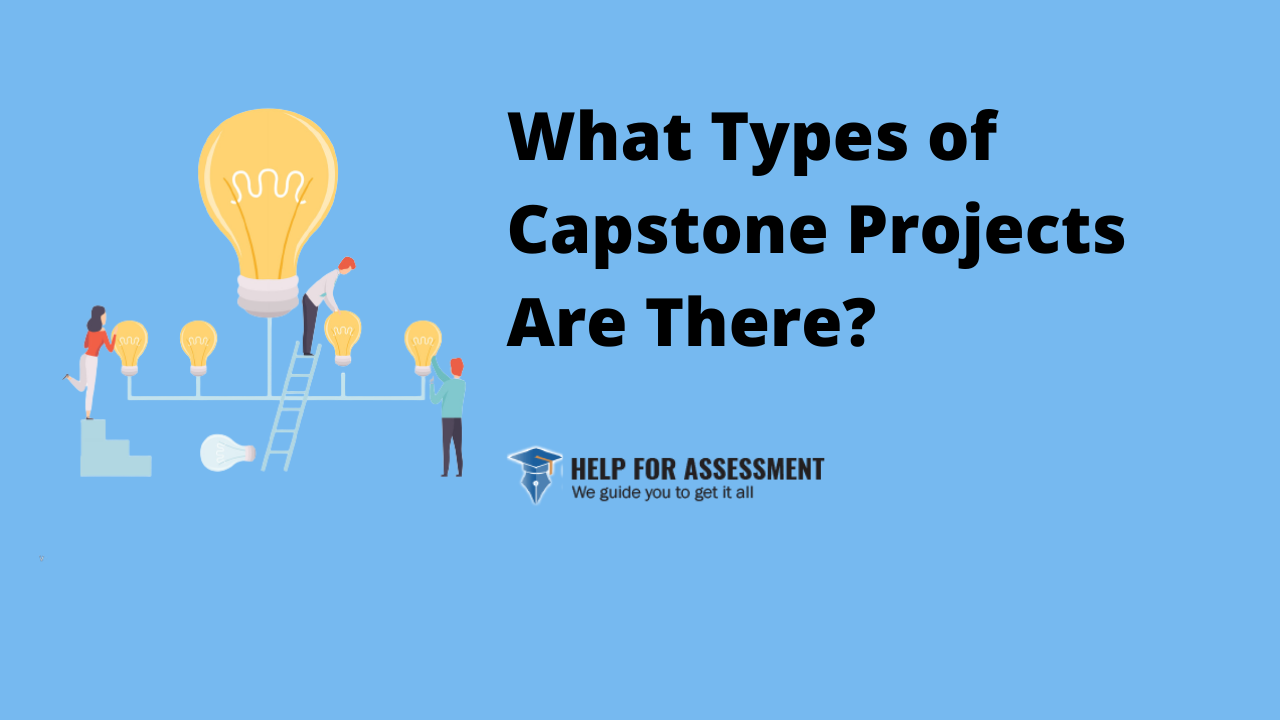
Capstone projects vary not just in the type of project, also in the level at which they are done.
There are projects for juniors and seniors in college as well as for postgraduate students.
Here are some examples of the forms of projects depending on the academic level.
- In-depth research projects.
- Developing the concept of a product, tool, or service.
- Expositions.
- Experiments.
Capstone projects can be conducted either individually or in a group.
However, the key thing is to make sure that the project proposal has been reviewed and approved by the instructor/panel/institution in charge before proceeding.
Senior Capstone Project
Senior projects are so called because they are done by high school students in their senior year.
Just like other projects, they represent a culmination of the coursework with an interdisciplinary application of knowledge and skills gained so far.
The project usually takes the better part of the final academic year and will have different parts to it, depending on the type of project chosen.
It will also require a presentation where the student(s) explain and describe the project to an audience, including their classmates.
Sample Capstone Project Outline
The write up for a project consists of several parts. However, even before starting the write-up, you need to do a few things:
- Come up with an idea for your project. What will be your subject matter, topic, or premise?
- Find sources for the project and review them beforehand to ensure that they will be of help to you.
- Come up with a step-by-step methodology for your project.
Using this information, you will then write a capstone project proposal for your project. It informs your instructor or review panel exactly what you intend to present so that they can approve or reject it.
Once approved, you can go on to the next stage. The final write-up has the following parts.
- A title page.
- Project outline.
- A description/abstract.
- Introduction
- Rationale/relevance/reason for doing the project.
- Objectives of the project.
- Procedures/methodology.
- Research and analysis.
- Evaluation of results and findings.
- Conclusion and future work/suggestions.
- Bibliography/works cited/reference list.
Note that the project is carried out in stages. Once approved, you will need to be submitting weekly or monthly status reports to your supervisor. After the project report is submitted, you will also have to make a presentation about the whole project.
This brief outline is only meant to be a rough guide. We have a much more detailed article detailing how you can do your capstone project, including a project template.
Capstone Project Examples
Help for Assessment has extensive experience when it comes to capstone projects of all kinds.
Whether it’s a high school project, a college capstone, or a senior capstone project, you can trust us to carry it out successfully for you.
You can check out various project samples here .
Get Help With Your Capstone Project
Capstone projects in every level of school are a make or break it deal. Given that they complete the graduation credits required, it makes sense to leave this important part of your coursework to experts.
We are proud to offer you a guide on how to write a capstone project here . If you need help, you can take advantage of our capstone project writing service at affordable, student-friendly rates with amazing discounts.
Check it out here and make your order to experience excellence, peace of mind, and success thanks to our stellar services.
About the author
Antony W is a professional writer and coach at Help for Assessment. He spends countless hours every day researching and writing great content filled with expert advice on how to write engaging essays, research papers, and assignments.
What Is a Capstone Project? Meaning, Importance, and Goals

Introduction
A capstone project is integral to the college degree educational program or any certification courses. It can take many different structures; however, its purpose remains the same. The capstone project is a unique chance to do independent gathering research to devise an innovative answer for a real-world issue. While a project of this degree and scale can be tested, it can likewise be exceptionally fulfilling. The capstone project is normally the last task. It assumes a vital part in preparing students for the world of work thanks to its practical applications and ability to improve students’ expert information and abilities.
What Is a Capstone Project?
A capstone project is a final assignment that students must complete in the last year of their academic program. It requires different scholarly exercises. This project assists young people with figuring out how to find and analyze information and how to function with it proficiently. It has a wide variety of structures. This implies that a capstone program can be submitted in different structures, including a multimedia presentation, film, execution, or paper. A capstone research project is the same as a college thesis. Nobody can argue that this sort of work is a bit more complicated as composing a capstone project includes a wider range of exercises like critical thinking, deep analysis, and the capacity to utilize various media.
Capstone projects are generally developed to energize students’ critical thinking, problem-solving, oral communication, research, and teamwork abilities. Additionally, thanks to this project, students figure out how to connect with the local area and break down significant issues, problems, and ideas. Some tasks incorporate outside-of-school experiences, similar to interviews and scientific observations.
Why Is Capstone Project Important?
Many factors make sense of its significance, and one of the principal factors is that it expands the austerity of academic studies during the senior year. How? You might ask. By and large, students take more straightforward courses for their last or senior year, which can lead to learning disappointment or inadequate preparation for their college work. Along these lines, a capstone project can assist with expanding preparation for college and work, diminish the deficiency of getting the hang of during the senior year and encourage productive work and new fascinating encounters with regard to science or different disciplines.
Also, it increases individual inspiration. Tasks like this require creative work on themes that are fascinating to an individual, which boosts inspiration.
Capstone projects are an incredible approach to showing the capability of learning. This sort of work can assist youngsters with deciding their capability and preparation to show what they have realized through the course of their project.
What is the Purpose of a Capstone Project?
- It Helps Build Your CV and Makes you Stand Out as a Candidate Undertaking a capstone project demonstrates to prospective employers that you’re something other than a potential competitor with fundamental academic qualifications. It shows your dedication to an issue that requires time and effort, as well as severe impressive skill, hard-working attitude, and experience working in a practical, active setting. One of the most impressive advantages of finishing your capstone project is that it assists you with standing apart from the group while applying for jobs. As it requires a long investment to finish, capstone projects are not conveyed by all students. Also, because it is a broad piece of paper, you can refer to it in your resume. Depending on the topic you picked, this paper proves that your correspondence, exploration, and project management abilities are great. Likewise, it shows your insight into the topic.
- It Offers Valuable Practical Experience As a graduate, getting a job can be difficult as many jobs require practical experience. Many graduates are areas of strength for theoretically reasonable candidates. However, an absence of applied knowledge in practical settings can make it trying to show such experience and abilities on their CV or in an interview. Another advantage of a capstone project is that it proves you have both theoretical and practical experience. You probably won’t consider this to be a significant advantage. However, it is. In this day and age, employers are searching for candidates that don’t just have the information to finish the work yet have practical experience as well. This is trying for students, as they have very few chances to acquire this experience. However, as a capstone paper is a project that forces you to leave your comfort zone and search for reliable sources of information, you gain precisely this practical experience. Whether you will talk with a nearby power or gather information on the field, you will level up your abilities massively.
- It Hones Specific Skills Highly Valued by Employers The capstone project envelops a genuine working society that plans to instill a bunch of specific skills that are both highly esteemed by employers and will, at last, work well for students in their careers. Assuming you choose to step into the working world or advance your studies, the way that you support your skills is crucial. You polish your skills with each paper you work on. Be that as it may, given the complexity and length of a capstone project, you further develop more skill classes. These sorts of tasks force you to further develop your critical thinking skills, as you need to choose relevant, valid, and true information. You could overcome difficulties along the way, yet they will assist you with helping your critical thinking skills. Assuming that you will interview somebody, you will level up your oral communication abilities through this experience.
- Overall Development of Students The strict meaning of capstone is the stone put on the structure’s highest point to finish its construction. Essentially, a capstone project refers to all students advancing through their course, coming full circle into a project. This project intends to help students tackle challenging problems, and improve relational abilities, public speaking, planning, teamwork, and so on. Fundamentally, to plan students for their work life. Students explore various ideas and utilize their abilities while doing this project. It additionally assists students with encountering learning techniques, including research, internships, and so forth.
The cycle of Doing A Capstone Project
- Select a topic that interests you and can get endorsed by the educator.
- Do a thorough literature review
- Conduct your broad research for the chosen topic.
- Present your outcomes
Goals of a Capstone Project
After completing the project, you will understand that you have developed areas of strength for a capacity and a deep understanding of the topic. Whenever got some information about academic grades, getting a passing mark on the project will likewise help you in your career. Thus, a capstone project will show your capacities.
The capstone project will likewise expand your presentation abilities. Many students can research, write, and present a decent project; however, they stumble while verbally presenting their project. So this is vital expertise.
This project intends to prepare you for your expert life, which you will be after you complete the project.
Capstone project vs. Thesis
Most believe that a capstone project and a thesis are very similar but not valid. The Thesis underscores more on an exploration situated approach for evaluating students’ figuring out capacities. Then again, a capstone project evaluates students’ status and type.
Similarities between a capstone project and a Thesis are that they require data collection, project execution, and giving the outcome.
In a thesis, students should add new thoughts and learnings. Then again, a capstone project expects students to gather data and give results concerning subjects of their advantage or, as of now, shown in their formal education.
Conclusion
A capstone project could appear to be troublesome. It is the last year project students need to finish and convey. Nonetheless, not all students could see its advantages and significance. A capstone project will force you to leave your comfort zone to examine a subject, conduct interviews, or gather information. Furthermore, the whole excursion from beginning to hugely work on your paper and finishing it will help you. It increases the value of your resume as it demonstrates you had the diligence and inspiration to finish it. It likewise demonstrates that you acquired down-to-earth insight outside the college, something managers are searching for.
To wrap things up, a capstone project assists you with further developing your abilities hugely. It will greatly help you to hone your oral communication, project management, critical thinking, and examination abilities while working on your capstone project. If your looking forward to upskills in new-age technologies like Business Analytics, Data Science, Product Management, Digital HR, etc and apply your learnings via a Capstone Project,
Fill in the details to know more
PEOPLE ALSO READ

Related Articles

What Are SOC and NOC In Cyber Security? What’s the Difference?
February 27, 2023
Fundamentals of Confidence Interval in Statistics!
February 26, 2023

A Brief Introduction to Cyber Security Analytics

Cyber Safe Behaviour In Banking Systems
February 17, 2023
Everything Best Of Analytics for 2023: 7 Must Read Articles!
December 26, 2022
Best of 2022: 5 Most Popular Cybersecurity Blogs Of The Year
December 22, 2022

From The Eyes Of Emerging Technologies: IPL Through The Ages
April 29, 2023

Data Visualization Best Practices
March 23, 2023

What Are Distribution Plots in Python?
March 20, 2023
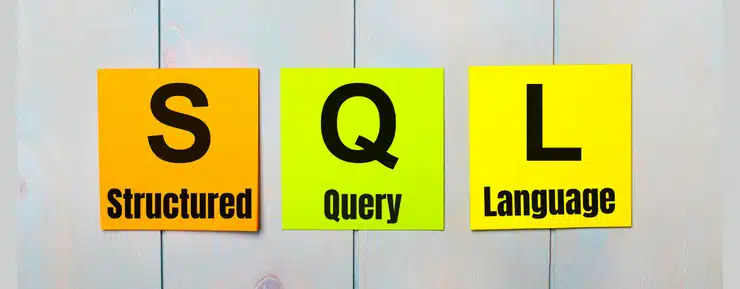
What Are DDL Commands in SQL?
March 10, 2023

Best TCS Data Analyst Interview Questions and Answers for 2023
March 7, 2023

Best Data Science Companies for Data Scientists !
Are you ready to build your own career?
Query? Ask Us
Enter Your Details ×

How to write a PhD thesis: a step-by-step guide
A draft isn’t a perfect, finished product; it is your opportunity to start getting words down on paper, writes Kelly Louise Preece
Kelly Louise Preece

Created in partnership with

You may also like

Popular resources
.css-1txxx8u{overflow:hidden;max-height:81px;text-indent:0px;} How to develop a researcher mindset as a PhD student
Formative, summative or diagnostic assessment a guide, emotions and learning: what role do emotions play in how and why students learn, how to assess and enhance students’ ai literacy, how hard can it be testing ai detection tools.
Congratulations; you’ve finished your research! Time to write your PhD thesis. This resource will take you through an eight-step plan for drafting your chapters and your thesis as a whole.

Organise your material
Before you start, it’s important to get organised. Take a step back and look at the data you have, then reorganise your research. Which parts of it are central to your thesis and which bits need putting to one side? Label and organise everything using logical folders – make it easy for yourself! Academic and blogger Pat Thomson calls this “Clean up to get clearer” . Thomson suggests these questions to ask yourself before you start writing:
- What data do you have? You might find it useful to write out a list of types of data (your supervisor will find this list useful too.) This list is also an audit document that can go in your thesis. Do you have any for the “cutting room floor”? Take a deep breath and put it in a separate non-thesis file. You can easily retrieve it if it turns out you need it.
- What do you have already written? What chunks of material have you written so far that could form the basis of pieces of the thesis text? They will most likely need to be revised but they are useful starting points. Do you have any holding text? That is material you already know has to be rewritten but contains information that will be the basis of a new piece of text.
- What have you read and what do you still need to read? Are there new texts that you need to consult now after your analysis? What readings can you now put to one side, knowing that they aren’t useful for this thesis – although they might be useful at another time?
- What goes with what? Can you create chunks or themes of materials that are going to form the basis of some chunks of your text, perhaps even chapters?
Once you have assessed and sorted what you have collected and generated you will be in much better shape to approach the big task of composing the dissertation.
Decide on a key message
A key message is a summary of new information communicated in your thesis. You should have started to map this out already in the section on argument and contribution – an overarching argument with building blocks that you will flesh out in individual chapters.
You have already mapped your argument visually, now you need to begin writing it in prose. Following another of Pat Thomson’s exercises, write a “tiny text” thesis abstract. This doesn’t have to be elegant, or indeed the finished product, but it will help you articulate the argument you want your thesis to make. You create a tiny text using a five-paragraph structure:
- The first sentence addresses the broad context. This locates the study in a policy, practice or research field.
- The second sentence establishes a problem related to the broad context you have set out. It often starts with “But”, “Yet” or “However”.
- The third sentence says what specific research has been done. This often starts with “This research” or “I report…”
- The fourth sentence reports the results. Don’t try to be too tricky here, just start with something like: “This study shows,” or “Analysis of the data suggests that…”
- The fifth and final sentence addresses the “So What?” question and makes clear the claim to contribution.
Here’s an example that Thomson provides:
Secondary school arts are in trouble, as the fall in enrolments in arts subjects dramatically attests. However, there is patchy evidence about the benefits of studying arts subjects at school and this makes it hard to argue why the drop in arts enrolments matters. This thesis reports on research which attempts to provide some answers to this problem – a longitudinal study which followed two groups of senior secondary students, one group enrolled in arts subjects and the other not, for three years. The results of the study demonstrate the benefits of young people’s engagement in arts activities, both in and out of school, as well as the connections between the two. The study not only adds to what is known about the benefits of both formal and informal arts education but also provides robust evidence for policymakers and practitioners arguing for the benefits of the arts. You can find out more about tiny texts and thesis abstracts on Thomson’s blog.
- Writing tips for higher education professionals
- Resource collection on academic writing
- What is your academic writing temperament?
Write a plan
You might not be a planner when it comes to writing. You might prefer to sit, type and think through ideas as you go. That’s OK. Everybody works differently. But one of the benefits of planning your writing is that your plan can help you when you get stuck. It can help with writer’s block (more on this shortly!) but also maintain clarity of intention and purpose in your writing.
You can do this by creating a thesis skeleton or storyboard , planning the order of your chapters, thinking of potential titles (which may change at a later stage), noting down what each chapter/section will cover and considering how many words you will dedicate to each chapter (make sure the total doesn’t exceed the maximum word limit allowed).
Use your plan to help prompt your writing when you get stuck and to develop clarity in your writing.
Some starting points include:
- This chapter will argue that…
- This section illustrates that…
- This paragraph provides evidence that…
Of course, we wish it werethat easy. But you need to approach your first draft as exactly that: a draft. It isn’t a perfect, finished product; it is your opportunity to start getting words down on paper. Start with whichever chapter you feel you want to write first; you don’t necessarily have to write the introduction first. Depending on your research, you may find it easier to begin with your empirical/data chapters.
Vitae advocates for the “three draft approach” to help with this and to stop you from focusing on finding exactly the right word or transition as part of your first draft.

This resource originally appeared on Researcher Development .
Kelly Louse Preece is head of educator development at the University of Exeter.
If you would like advice and insight from academics and university staff delivered direct to your inbox each week, sign up for the Campus newsletter .
How to develop a researcher mindset as a PhD student
A diy guide to starting your own journal, contextual learning: linking learning to the real world, what does a university faculty senate do, hybrid learning through podcasts: a practical approach, how exactly does research get funded.
Register for free
and unlock a host of features on the THE site
The Ohio State University
- BuckeyeLink
- Search Ohio State

Safety innovation grant allows professor to develop life-saving technology

Jeremy Seidt, a research associate professor within The Ohio State University’s Department of Mechanical and Aerospace Engineering, was awarded a Workforce Safety Innovation Grant through the Ohio Bureau of Workers’ Compensation (BWC) for his Proof-of-Concept Project.
Seidt’s project is an Oxygen Concentrating Self-Rescuer (OCSR)—a personal, wearable air purifier that uses an innovative circuit of chemical and physical filters to sieve and contain oxygen from the environment, remove any toxic gases, and leave its users with breathable air.
Inspired by decades of coal mining tragedies, Seidt designed the OCSR to filter out methane and carbon monoxide—the latter of which is a great concern for miners, who can sometimes become trapped underground in carbon monoxide-rich environments due to methane explosions.
Miners typically carry Self-Contained Self-Rescuers (SCSRs), belt-wearable devices that contain a chemical, solid O2 that reacts to create gaseous, breathable O2.
“SCSRs have a finite operational life,” Seidt explained. “Once ignited, the O2 reaction lasts about 30 to 60 minutes, depending on the model. If the worker can’t escape in that limited amount of time, they will likely die.”
Seidt continued that such injuries are not caused by a lack of oxygen, as there is already plenty of oxygen available in the air, but by exposure to noxious gases that co-occur.
Seidt’s innovation seeks to supply workers the air they need, not by bringing in an external oxygen supply such as a SCSR or an oxygen tank, but by pumping air through the OCSR’s maze-like circuit of molecular and electrolytic sieves and catalyzing zeolite bed, which collect the oxygen already present and remove any unwanted gases.
With a greater supply of filterable air available than the amount of oxygen one SCSR can hold, the OCSR seeks to give trapped miners—and workers in fields such as firefighting, Homeland Security, and the Department of Defense—the time they need to complete their tasks and escape to safety.
Seidt believes that the device, with modifications, could have significant implications specifically for firefighting.
“We believe that this device will be transformative for both structural and wildland firefighters,” Seidt said. “We expect the OCSR to weigh about half that of a Self-Contained Breathing Apparatus (SCBA) oxygen tank, meaning that firefighters will be more likely to use it in a smoldering, post-fire environment. This will reduce respiratory ailments such as lung cancer in these workers.”
“Wildland firefighters typically use no respiratory protection since they must traverse long distances and rugged terrain. A lighter OCSR device could bring basic respiratory protection to this workforce.” Siedt said.
The BWC’s Workforce Innovation Grants are a total of $5 million awards given to those creating innovations that improve workplace health and safety. Two Proof-of-Concept Projects grants and three Prototype Projects grants were awarded to individuals from various research organizations across the state. Seidt was awarded over $500,000 to test the OCSR concept.
Being a recipient of the award not only allows Seidt to develop a potentially life-saving technology, but it allows The Ohio State University Engineering students the opportunity, as well.
“It’s been great working with Piyanadda (Ploy) Thipyapong (Aeronautical and Astronautical, Master of Science student) on this project. She’s been building the proof-of-concept gas separation apparatus and programming the control and data acquisition system. Her Master of Science thesis will be entirely based on this work,” Seidt explained. “Also, post-doctoral candidate in Materials Science and Engineering, Sedzro Tamakloe, is fabricating an O2 pump module that will be integrated in the device. Yahye Ahmed, aerospace engineering undergraduate student, has been supporting the project in materials acquisition and support for Ploy. It’s been a great team effort.”
Seidt and his team are working on the project with two industry partners, Energetic Systems and Zeovation, a company founded by a former professor at the University. Experiments to test the concept are ongoing.
“I’m looking forward to seeing Ploy’s first data sets. I believe that we’ll be successful in the proof-of-concept phase,” Seidt said. “Hopefully, we’ll receive funding next year for the Phase II effort to develop a prototype OCSR. I’m optimistic this will be foundational work for truly transformative personal protection equipment.”
Related News


IMAGES
VIDEO
COMMENTS
The thesis, also called a "dissertation," is a super-sized form of a research paper that serves as the final project before you complete your master's degree or doctoral degree. One of the primary differences between a thesis and a capstone is the scholarly nature of the thesis, which allows you to contribute valuable research to your ...
Thesis projects typically involve independent research and analysis. Both capstone and thesis projects require a significant amount of time and effort. It is important to note that regardless of the project chosen, proper grammar and language use are essential to effectively communicate ideas and research findings.
Difference Between Capstone and Thesis Definition. A capstone is a multilayered project that serves as a culminating academic experience for students, typically at the end of an academic program, whereas a thesis is a long research paper that typically serves as the final project for a university degree. Nature
Capstone Project Meaning. A capstone project is a comprehensive, culminating academic endeavor undertaken by students typically in their final year of study. ... Thesis: Capstone: The primary purpose of a thesis paper is to contribute new knowledge or insights to the academic field. It involves conducting original research, analyzing findings ...
In many ways a thesis and a capstone are similar. They both follow a similar basic format and represent a scholarly effort of high quality. However, practice-based programs can use a capstone ... available or collected, define the process of analysis Results Tables, figures and written text of results Tables, figures and written text
In other words, a thesis is completed for a Masters-level degree, while a dissertation is completed for PhD (or any other doctoral-level degree). Simply put, a dissertation and a thesis are essentially the same thing, but at different levels of study. The exact terminology varies from country to country, and sometimes it even varies between ...
The main difference between a capstone project and a thesis is that a capstone project addresses a specific problem, issue or concern in your field of study, and a thesis attempts to create new knowledge. A **capstone project focuses on a narrow, specific topic**, whereas a **thesis addresses a broader, generalized ...
The capstone project in college is the apogee, or completion marker, of a student's coursework leading to the culmination of their program with a degree in their chosen field of study. The original definition of a capstone focuses on the actual stone placed at the top of a wall or building, marking the successful completion of the structure.
Much like a thesis paper or capstone project, a dissertation requires extensive research, critical analysis, and a thorough understanding of the subject matter. By comparison, a dissertation is a research project that is typically required for a doctoral degree, while a capstone project is a culminating project that is required for a master's ...
It is usually a shorter and less complex study compared to a dissertation. A thesis may involve original research, but it can also be a literature review, a case study, or a critical analysis of existing research in the field of study. Capstone: A capstone is a culminating project required to complete a degree program.
The capstone project is a unique opportunity to carry out independent group research in order to devise an innovative solution for a real-world problem. While a project of this scope and scale can be challenging, it can also be very rewarding. The capstone project is usually the final assignment and plays a vital role in preparing students for ...
Thesis and capstone projects synthesize your overall learning, taking the knowledge you've gained throughout your program and applying it to your own research. A thesis, which often requires more intensive research than a capstone, may span multiple years depending on the level of the psychology program. Often involving scholarly and clinical ...
Thesis vs. Project. thesis. terminal project/capstone. Basic Definition. Substantial paper presenting independent research that makes a contribution to the current body of knowledge in a scholarly field. Typically includes five basic chapters or divisions: an introduction and statement of the problem, a review of the literature pertinent to the ...
The library offers a bindery service for graduate students interested in having copies of their thesis or capstone report bound in a durable, sturdy, and attractive hardcover binding. Students are charged a fee per volume for the service. To request binding of a thesis or capstone report, please send an email to [email protected].
The three capstone options are: CSEC 790 MS Thesis - This course is a capstone course in the MS in Computing Security program. It offers students the opportunity to investigate a selected topic and make an original contribution which extends knowledge within the computing security domain. As part of their original work students will write and ...
The capstone thesis is a study conducted by the student. According to the EOP Manual , it "must have a substantial research component, present an original argument, use proper academic conventions, including carefully documented primary and/or secondary sources, and should be at least fifty pages in length [not including front and back matter
Capstone projects are generally designed to encourage students to think critically, solve challenging problems, and develop skills such as oral communication, public speaking, research skills, media literacy, teamwork, planning, self-sufficiency, or goal setting—i.e., skills that will help prepare them for college, modern careers, and adult life.
Writing. Tip #1 Topic selection and brainstorming: Consider your assignment. 1:34. Tip #2 Narrow your topic: General searches and organization. 7:12. Tip #3 Formulate research question and ask yourself questions. 13:05. Tip #4 Working thesis: The main idea, the argument, and idea supporting the argument. 16:50.
A capstone is a culminating experience of rigorous academic achievement: (a) integrating knowledge from one's discipline(s); (b) applying specific knowledge; (c) demonstrating knowledge and expertise to the appropriate disciplinary community; and (d) illustrating readiness for transition into more advanced professional or academic pursuits.
5. Capstone vs Dissertation: Determine what your long-term goals are. Think about this decision first through the lens of what you want to do with your doctorate. If your goal is to continue in higher education as a faculty member or if you want to continue conducting and publishing research, then the dissertation is likely to be a better option.
Capstone projects vary not just in the type of project, also in the level at which they are done. There are projects for juniors and seniors in college as well as for postgraduate students. Here are some examples of the forms of projects depending on the academic level. In-depth research projects. Developing the concept of a product, tool, or ...
A capstone course, also known as a synthesis and capstone project, senior synthesis, among other terms, is a project that serves as the culminating and usually integrative praxis experience of an educational program mostly found in American-style pedagogy. Although somewhat different from an industry-oriented capstone project, case study, case ...
The strict meaning of capstone is the stone put on the structure's highest point to finish its construction. Essentially, a capstone project refers to all students advancing through their course, coming full circle into a project. ... Similarities between a capstone project and a Thesis are that they require data collection, project execution ...
It often starts with "But", "Yet" or "However". The third sentence says what specific research has been done. This often starts with "This research" or "I report…". The fourth sentence reports the results. Don't try to be too tricky here, just start with something like: "This study shows," or "Analysis of the data ...
Capstone. Technical Elective Program. ... (SCBA) oxygen tank, meaning that firefighters will be more likely to use it in a smoldering, post-fire environment. ... Her Master of Science thesis will be entirely based on this work," Seidt explained. "Also, post-doctoral candidate in Materials Science and Engineering, Sedzro Tamakloe, is ...